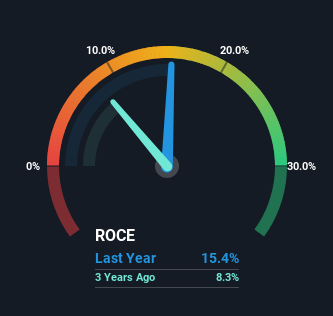- South Korea
- /
- Machinery
- /
- KOSDAQ:A333620
Nsys (KOSDAQ:333620) Will Be Hoping To Turn Its Returns On Capital Around
What trends should we look for it we want to identify stocks that can multiply in value over the long term? In a perfect world, we'd like to see a company investing more capital into its business and ideally the returns earned from that capital are also increasing. This shows us that it's a compounding machine, able to continually reinvest its earnings back into the business and generate higher returns. However, after briefly looking over the numbers, we don't think Nsys (KOSDAQ:333620) has the makings of a multi-bagger going forward, but let's have a look at why that may be.
Understanding Return On Capital Employed (ROCE)
Just to clarify if you're unsure, ROCE is a metric for evaluating how much pre-tax income (in percentage terms) a company earns on the capital invested in its business. To calculate this metric for Nsys, this is the formula:
Return on Capital Employed = Earnings Before Interest and Tax (EBIT) ÷ (Total Assets - Current Liabilities)
0.15 = ₩10b ÷ (₩101b - ₩36b) (Based on the trailing twelve months to September 2024).
Thus, Nsys has an ROCE of 15%. In absolute terms, that's a satisfactory return, but compared to the Machinery industry average of 6.5% it's much better.
View our latest analysis for Nsys

While the past is not representative of the future, it can be helpful to know how a company has performed historically, which is why we have this chart above. If you want to delve into the historical earnings , check out these free graphs detailing revenue and cash flow performance of Nsys.
So How Is Nsys' ROCE Trending?
The trend of ROCE doesn't look fantastic because it's fallen from 51% four years ago, while the business's capital employed increased by 348%. That being said, Nsys raised some capital prior to their latest results being released, so that could partly explain the increase in capital employed. It's unlikely that all of the funds raised have been put to work yet, so as a consequence Nsys might not have received a full period of earnings contribution from it.
The Bottom Line
In summary, despite lower returns in the short term, we're encouraged to see that Nsys is reinvesting for growth and has higher sales as a result. These growth trends haven't led to growth returns though, since the stock has fallen 55% over the last three years. So we think it'd be worthwhile to look further into this stock given the trends look encouraging.
On a final note, we've found 1 warning sign for Nsys that we think you should be aware of.
For those who like to invest in solid companies, check out this free list of companies with solid balance sheets and high returns on equity.
Valuation is complex, but we're here to simplify it.
Discover if Nsys might be undervalued or overvalued with our detailed analysis, featuring fair value estimates, potential risks, dividends, insider trades, and its financial condition.
Access Free AnalysisHave feedback on this article? Concerned about the content? Get in touch with us directly. Alternatively, email editorial-team (at) simplywallst.com.
This article by Simply Wall St is general in nature. We provide commentary based on historical data and analyst forecasts only using an unbiased methodology and our articles are not intended to be financial advice. It does not constitute a recommendation to buy or sell any stock, and does not take account of your objectives, or your financial situation. We aim to bring you long-term focused analysis driven by fundamental data. Note that our analysis may not factor in the latest price-sensitive company announcements or qualitative material. Simply Wall St has no position in any stocks mentioned.
About KOSDAQ:A333620
Nsys
Engages in the manufacture of 3D vision inspection equipment and PDP process automation solutions.
Flawless balance sheet with slight risk.
Market Insights
Community Narratives



